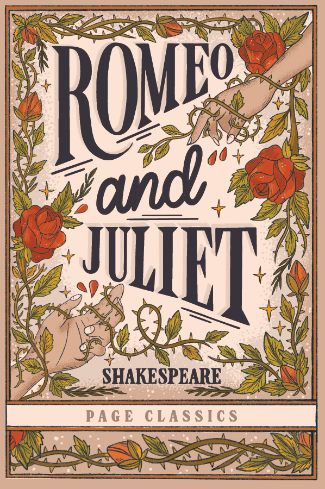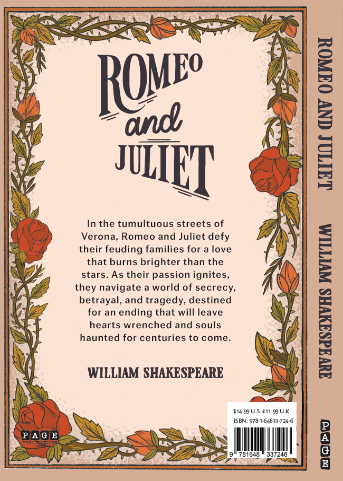Romeo and Juliet William Shakespeare
- Regular price
- $7.50 USD
- Regular price
-
$14.99 USD - Sale price
- $7.50 USD
- Unit price
- per
Type : Classic Literature
SKU : 9781648337246
Couldn't load pickup availability
In **Romeo and Juliet**, **William Shakespeare** creates a world defined by **violence**, **hatred**, and the destructive power of **family feuds**. The play is set in **Verona**, where the **Montagues** and the **Capulets** are locked in a bitter and long-standing rivalry. This feud shapes the very fabric of their lives, influencing everything from their interactions with one another to the way they view love, honor, and loyalty. Against this chaotic backdrop, two young people, **Romeo** and **Juliet**, fall deeply in love, despite the fact that their families would never allow such a relationship.
Their love is not merely **disapproved of**—it is forbidden, as the very families to which they belong are sworn enemies. The **violence** between the families is not just a backdrop but a driving force in the events that unfold. From the opening brawl to the tragic deaths of the lovers, Shakespeare’s portrayal of **Romeo and Juliet’s** love is set against a world where love and hate are inseparable, where passion leads to conflict, and where youthful idealism is crushed by the brutal reality of their circumstances.
The **tragic inevitability** of the story is a key theme. The lovers’ **swift union in death**, following their **love at first sight**, seems almost **predestined** given the violent world they inhabit. Their love, in its purest form, becomes a force that cannot exist without the tragic consequences of the world around them. As their love grows, so too does the **tension** that surrounds them, until their fate is sealed by a series of misunderstandings, miscommunications, and the relentless forces of fate.
Despite the play's setting in such a tumultuous world, **Romeo and Juliet** has come to represent the **quintessential story of young love**. What makes their relationship so universal is not just the drama of their situation, but the **intensity and purity** of their feelings for each other. **Shakespeare’s language**, especially in the dialogue between Romeo and Juliet, elevates their love to an idealized level, where their emotions seem to transcend the constraints of the physical world. In their eyes, love is something transcendent, something that makes all other concerns—family loyalty, social expectations, even life itself—seem secondary.
The **poetry** Shakespeare uses in their exchanges makes it easy for audiences to see their love as something universal, something that could apply to **all young lovers**. Their passionate and impetuous love is full of youthful **idealism** and **intensity**, which, in part, is why we respond to their story so emotionally. It’s not just about their love in a specific historical or social context, but about the **timeless experience** of young love itself—love that is **urgent**, **all-consuming**, and **unpredictable**.
In the end, **Romeo and Juliet** isn’t just a story about two lovers caught in the throes of a family feud; it is a reflection on the **fragility of life**, the **power of love**, and the ways in which **misunderstanding and fate** can shape our destinies. Shakespeare’s ability to capture the beauty and pain of young love through such **exquisite language** makes the play feel as though it speaks to everyone, no matter the time or place. Their love becomes a symbol not only of youthful passion but also of the **costs of familial conflict**, making the tragedy all the more poignant and the love all the more unforgettable.
5.1 x 7.87 (Inches)
6115 Pages



